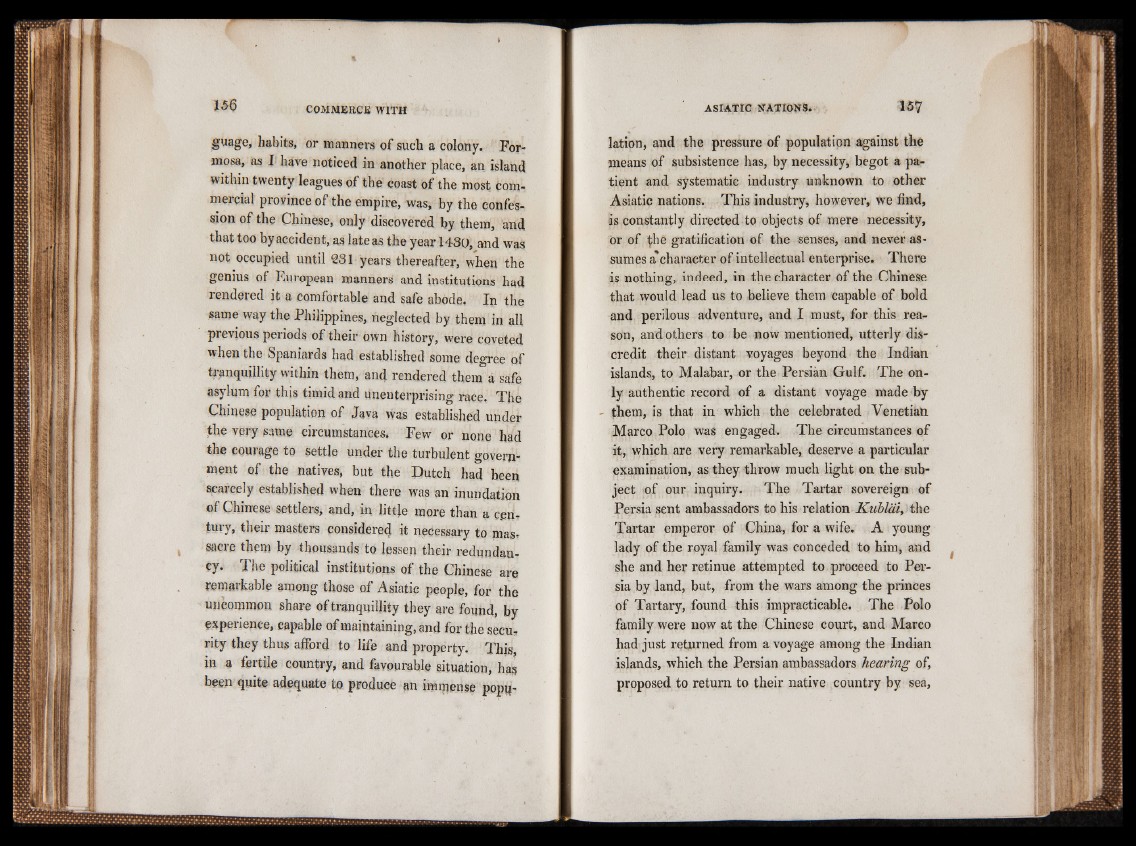
guage, habits, or manners of such a colony. Formosa,
as I have noticed in another place, an island
within twenty leagues of the coast of the most commercial
province of the empire, was, by the confession
of the Chinese, only discovered by them, and
that too by accident, as late as the year 1430, and was
not occupied until 231 years thereafter, when the
genius of European manners and institutions had
rendered it a comfortable and safe abode. In the
same way the Philippines, neglected by them in all
previous periods of their own history, were coveted
when the Spaniards had established some degree of
tranquillity within them, and rendered them a safe
asylum for this timid and unenterprising race. The
Chinese population of Java was established under
the very same circumstances. Few or none had
the courage to settle under the turbulent government
of the natives, but the Dutch had been
scarcely established when there was an inundation
of Chinese settlers, and, in little more than a century,
their masters considered it necessary to massacre
them by thousands to lessen their redundancy.
The political institutions of the Chinese are
remarkable among those of Asiatic people, for the
uncommon share of tranquillity they are found, by
experience, capable of maintaining, and for the security
they thus afford to life and property. This,
ill a fertile country, and favourable situation, has
been quite adequate to produce an immense popqlation,
and the pressure of population against the
means of subsistence has, by necessity, begot a patient
and systematic industry unknown to other
Asiatic nations. This industry, however, we find,
is constantly directed to objects of mere necessity,
or of fhé gratification of the senses, and never assumes
a%character of intellectual enterprise. There
is nothing, indeed, in the character of the Chinese
that would lead us to believe them capable of bold
and perilous adventure, and I must, for this reason,
and others to be now mentioned, utterly discredit
their distant voyages beyond the Indian
islands, to Malabar, or the Persian Gulf. The only
authentic record of a distant voyage made by
them, is that in which the celebrated Venetian
Marco Polo was engaged. The circumstances of
it, which are very remarkable, deserve a particular
examination, as they throw much light on the subject
of our inquiry. The Tartar sovereign of
Persia sent ambassadors to his relation Kublal, the
Tartar emperor of China, for a wife. A young
lady of the royal family was conceded to him, and
she and her retinue attempted to proceed to Persia
by land, but, from the wars among the princes
of Tartary, found this impracticable. The Polo
family were now at the Chinese court, and Marco
had just returned from a voyage among the Indian
islands, which the Persian ambassadors hearing of,
proposed to return to their native country by sea,